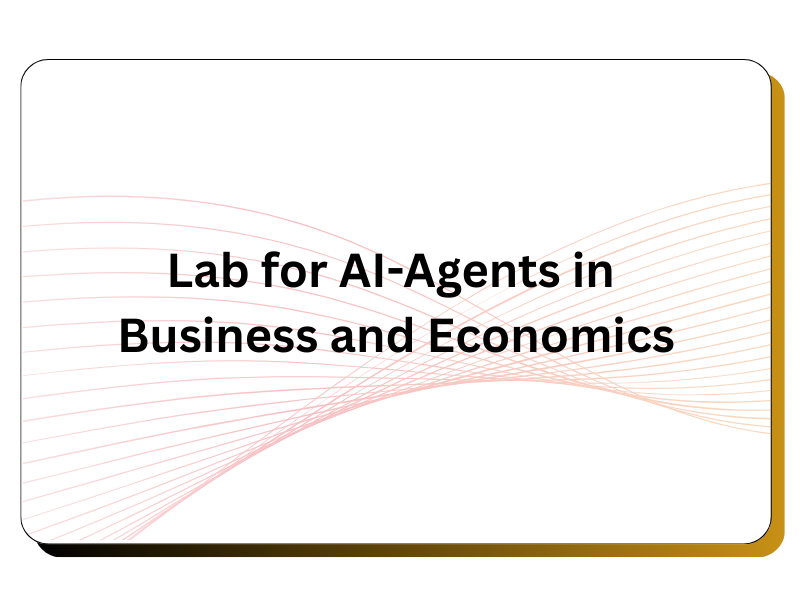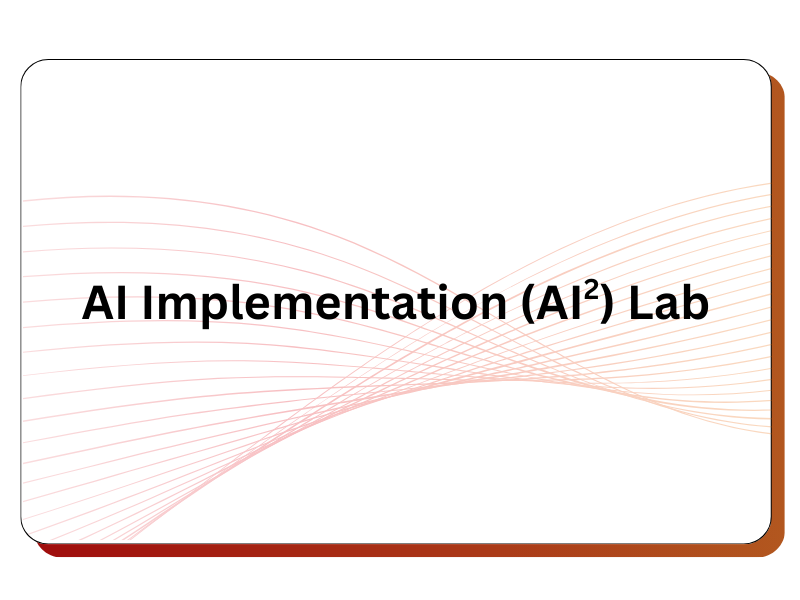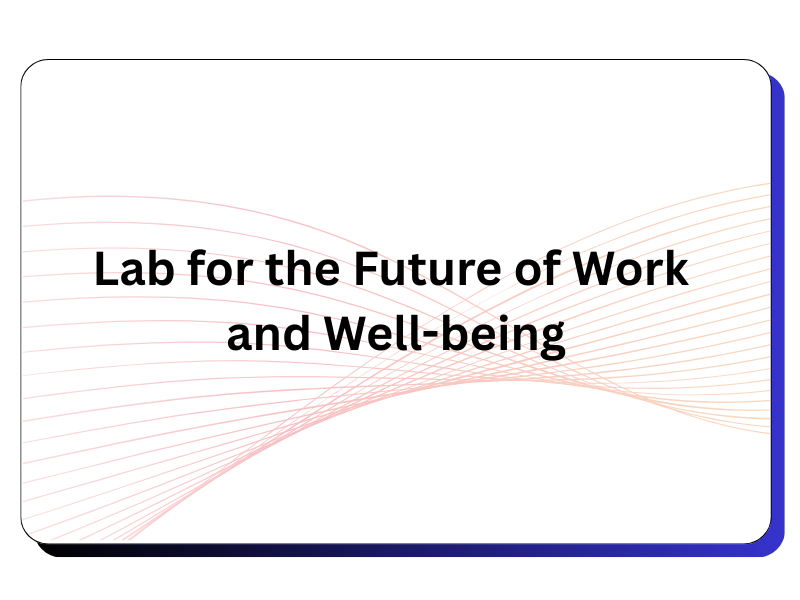Deloitte-HKU Lab for Organizational Transformation
Lab Directors:

Prof. Matthias Fahn
Associate Professor, Management and Strategy

Prof. Jie Gong
Associate Professor, Economics and Management and Strategy
Mission
Our mission is to understand how organizations should adapt to the challenges and opportunities of artificial intelligence. We research effective responses and develop frameworks to help leaders successfully implement AI in their organizations.
Core Objectives
AI is transforming the foundation of organizational success – how to attract talent, motivating them, and coordinating their efforts. Through rigorous research and real-world insights, we aim to:
the real-world state of AI transformation in firms across industries
the common pitfalls and strategic missteps that organizations should avoid
practical frameworks to help organizations adapt and thrive in the AI era
📚 Research Projects
Generative AI boosts efficiency but can lower work quality. In an experiment with professional illustrators, we found that AI speeds up early progress but limits further improvement. Many chose to trade quality for speed, revealing a key challenge: GenAI may undermine motivation for creative excellence and innovation.
We argue that widespread AI adoption raises the cost of incentivizing high human performance, as improved baseline outcomes make “good enough” results more acceptable to firms. Our analysis shows this “shirk-biased technological change” can reduce firm profitability and alter labor market dynamics—workers may benefit initially, but gains fade as competition grows. European regulatory frameworks, which give workers more say in AI adoption, may preserve higher value per worker but could limit competitiveness compared to less regulated regions. Ultimately, firms outside Europe may achieve higher profits per worker and outcompete their European counterparts over time.
This project explores how AI influences doctors when they disagree on diagnoses. Disagreements stem from attention (objective, complementary) and comprehension (subjective, substitutive) differences. Uninterpretable AI can be more persuasive by letting doctors attribute disagreements to attention gaps, especially for those with lower abnormality detection skills or career concerns. This can ultimately improve diagnostic accuracy.
📊 AI Adoption in Enterprise: Deloitte-HKU C-Suite Survey
Organizational and executional barriers, rather than technical limits, are the biggest obstacles to realizing AI’s potential, according to a survey of 100+ C-suite executives. Most firms are piloting customer and operational applications, yet few have scaled them to deliver profit, and nearly half report ROI below expectations. While Customer Service will deepen and R&D is emerging as a frontier, the shift from efficiency to innovation remains gradual. Still, leaders are broadly optimistic and plan to keep investing.
1. Executive Summary
This survey of over 100 C-suite executives highlights the gap between AI aspirations and outcomes. While most firms are piloting or adopting AI in customer-facing and operational functions, only a small minority have scaled initiatives to deliver measurable profit impact. Executives often overestimate ROI, with nearly half reporting results below expectations.
The dominant barriers are organizational and executional rather than purely technical. While future priorities largely mirror current usage, Customer Service is set to deepen and R&D emerges as a growth frontier, pointing to a gradual shift from efficiency to innovation. Despite uneven returns, most leaders remain optimistic about AI’s long-term potential and plan to expand investment.
2. Response Profile
The survey covered 100+ C-suite executives, mostly CEOs/CTOs/CIOs (70%), and was weighted toward large enterprises (44% with >5,000 employees). Key sectors include consumer/retail, automotive, and energy — industries facing both customer-driven and operational transformation pressures.
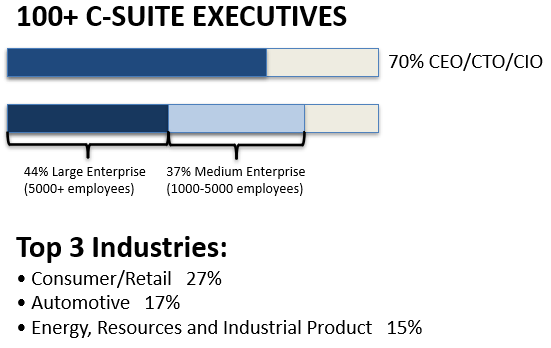
3. Current State of AI Adoption: Early Stage Despite High Expectations
While AI adoption is widespread, most organizations remain at the experimentation and early adoption stages (69%), where benefits are limited to team-level efficiencies. Only a small share (23%) have progressed to operational or scaled deployments with measurable P&L impact, and just 4% describe themselves as transformational. This reveals a clear gap: executives are optimistic about AI’s future impact, but enterprise-wide integration is still rare.
4. Reality Check: Expectations vs. Outcomes
Executives consistently overestimated the financial returns of AI initiatives.
- High expectations: At launch, many expected strong ROI (21% anticipated 10-25%, 9% 26-50%), while 30% dismissed ROI as “not relevant” at early stages, treating early AI projects as strategic rather than profit-driven.
- Underwhelming reality: Outcomes skewed lower — 9% reported negative returns, 34% minimal (<10%), and 36% could not estimate due to poor tracking.
- Expectation gaps: 45% reported returns below expectations; only 10% exceeded them.
5. The Five Critical Barriers to AI Success
To understand why realized ROI falls short of expectations, we asked executives to identify barriers at two levels: (1) broad categories (e.g., organizational, technical, strategic), and (2) specific reasons within those categories.
Broad Categories
At the category level, executives point first to organizational and cultural factors (50%) and execution challenges (47%), ahead of technical constraints (39%). Strategic/planning issues (33%) and risk/compliance concerns (26%) were cited less often.
Detailed Reasons
When we aggregate responses across categories, the top five reasons reveal organizational and executional challenges ahead of technical, and strategic issues:
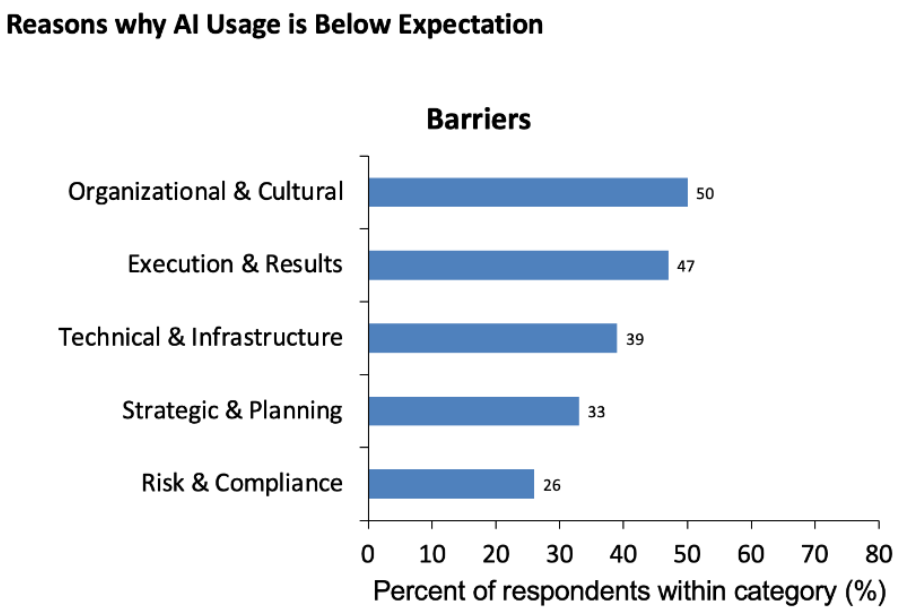
- Siloed departments (33%) — cross-functional efforts blocked.
- Lack of quick wins (32%) — confidence erodes without visible results.
- Data quality & availability (31%) — integration bottlenecks.
- Resistant culture (28%) — entrenched practices slow uptake.
- Limited understanding of AI (27%) — expectations misaligned with reality.
Together, these findings highlight that the dominant barriers are organizational and executional, not technical. For executives, this underscores the need to treat AI adoption as an organizational transformation effort, requiring alignment across leadership, culture, and strategy.
Top 10 Detailed Reasons for AI Usage Below Expectation
6. Current and Future AI Application Areas
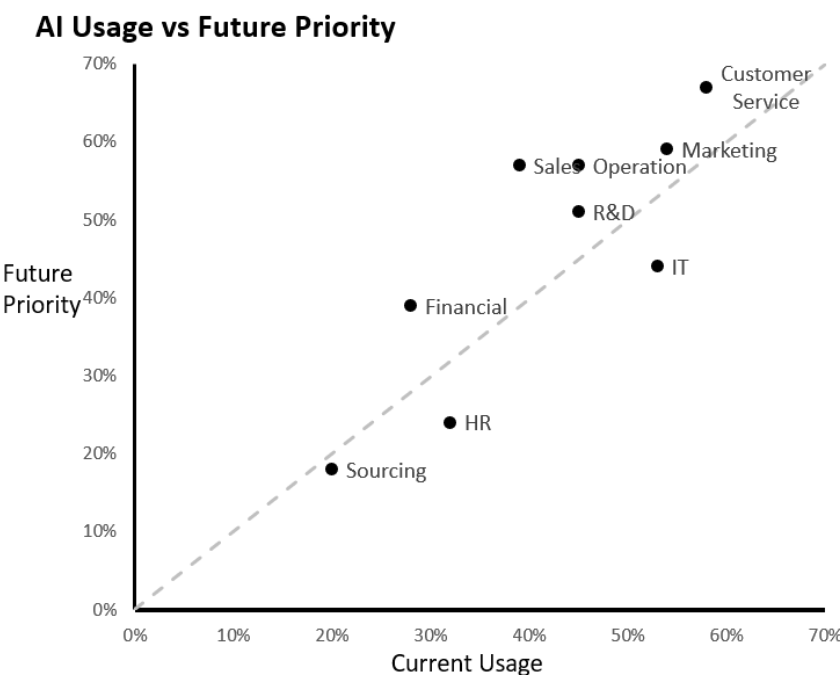
Today, AI is concentrated in Customer Service (58%), Marketing (54%), and IT/Technology (53%). Moderate adoption is seen in R&D (45%) and Operations (45%), while Finance (28%), HR (32%), and Sourcing (20%) lag.
Future priorities largely mirror the present, but with notable shifts:
- Customer Service will deepen (67%),
- R&D will rise as a strategic frontier (51%),
- IT/Technology is seen as more mature with limited incremental expansion.
7. Future Outlook: Optimistic but Uneven
Executives see AI’s impact growing over time. In the next two years, projected business value are modest (10–30% of business value), but in five years, many forecast 20-50%. This gap shows that leaders are conservative in the short term but optimistic about AI’s long-run potential.
Investment plans reflect this confidence: nearly one-third of firms expect to increase AI budgets significantly (>25%), and most plan at least modest growth.
Expectations remain widely dispersed (5%–80%), reflecting industry differences and uncertainty about value realization. Nonetheless, fear of being left behind and belief in AI’s transformative potential continue to drive aggressive investment.
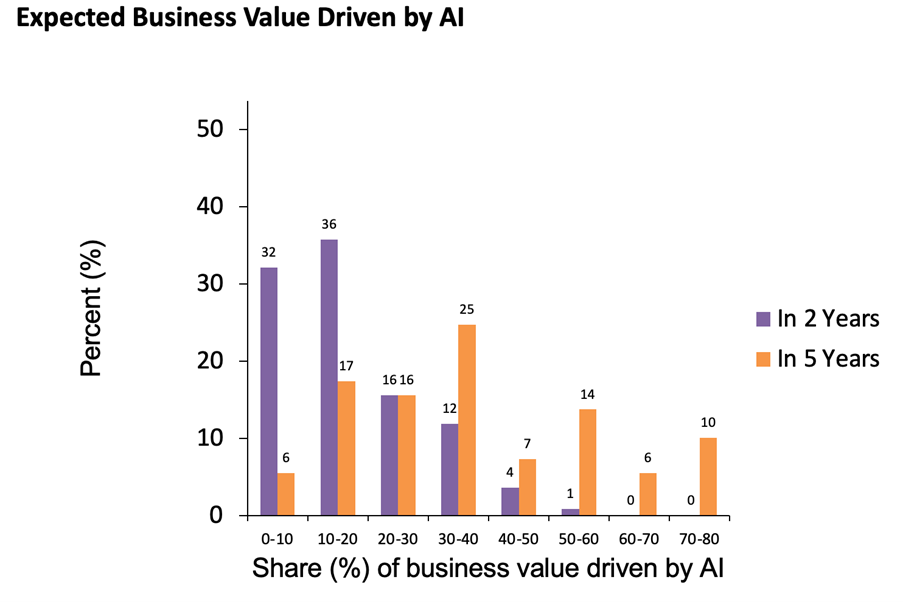
8. Key Implications
- AI adoption is widespread but shallow. Most firms remain in pilot or early adoption phases, with only a minority reaching enterprise-wide impact linked to P&L.
- Returns remain elusive. Executives tend to overestimate ROI, with nearly half reporting outcomes below expectations, pointing to weak measurement and overly ambitious business cases.
- Barriers are organizational more than technical. While data quality and integration matter, the most persistent hurdles are silos, cultural resistance, and execution discipline.
- Future priorities largely reinforce the present. Functions with strong adoption today (Customer Service, Marketing, Operations) will continue to dominate, though Customer Service will deepen and R&D is set to rise, signaling a gradual pivot from efficiency to innovation.
- Optimism drives investment despite uncertainty. Executives remain bullish about AI’s long-term value, with most planning budget increases, even as industries differ sharply in their projections and paths to value realization.
Research Labs.
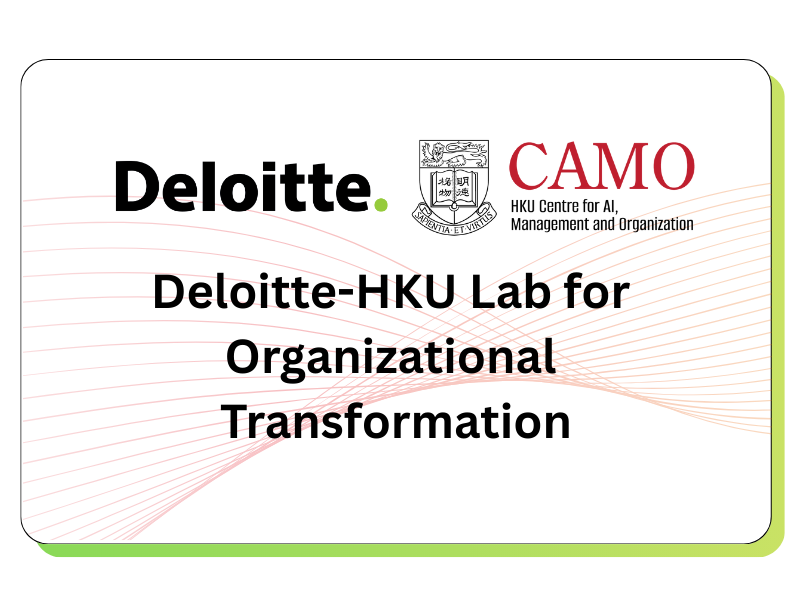
Deloitte-HKU Lab for Organizational
Transformation
The success of organizations depends on its ability to attract the right people, motivate effective action, and coordinate efforts. Artificial intelligence is transforming all three of these areas, requiring organizations to adapt their structures for the new challenges and opportunities.
Our lab focuses on guiding this essential transformation. Our work identifies effective organizational response and examine their interaction with markets, norms, and institutions. Through research and collaboration with industry practitioners, we assess the current state of AI adoption in firms, identify common pitfalls, and develop frameworks that help leaders structure and address these critical challenges.
Lab for AI-Agents in Business and Economics
Our mission is to pioneer AI-driven solutions for business challenges by developing multi-agent systems and domain-specific AI architectures, while guiding organizations through ethical, scalable, and transformative AI adoption. We focus on developing platforms for AI agents and multi-agent architecture for business and management, designing AI agents for specific business applications with deep domain knowledge, and studying the economic impact of AI transformation on human behavior, business and organizations.
AI Implementation (AI2) Lab
The AI Implementation (AI2) Lab is dedicated to turning AI and business research into real-world AI adoption. We collaborate with organizations to identify frictions, develop deployment strategies, and measure impact of AI implementation. Our work focuses on helping firms adopt and scale AI, designing business models for the AI era, and incubating AI-related innovations through experimentation and prototyping.
Lab for the Future of Work
and Well-being
Our mission is to advance understanding of how generative AI is transforming labor markets, leisure, and overall wellbeing, with a particular focus on China. We are committed to conducting rigorous, data-driven, and causally robust research to generate actionable insights. Distinctively, our people-centered approach places human wellbeing at the core of our analysis, going beyond productivity and profitability to explore how technological change can foster better jobs and lives.

Contact Info
Social Media
Copyright © HKU Centre for AI, Management Organization 2025. All rights reserved.

